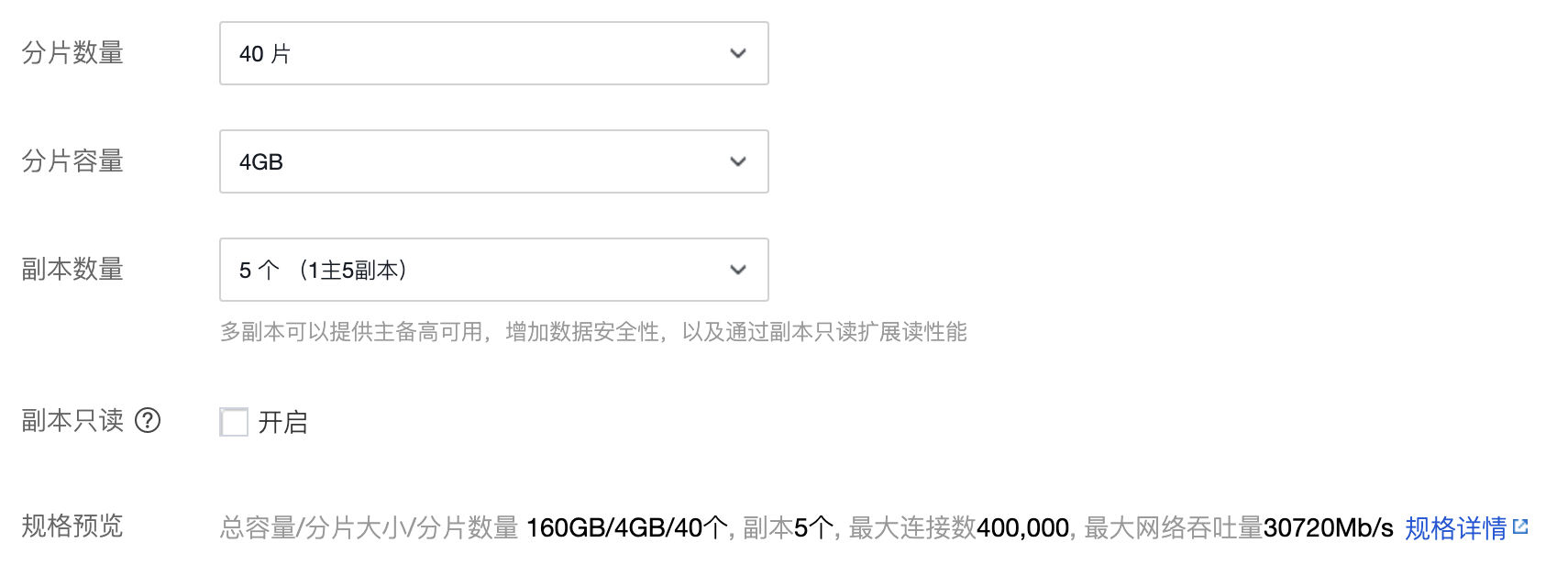Here's an example. Suppose we need to implement a product sale specification list that includes selectable shard numbers, shard capacity, and replica numbers, as shown in the image below (non-production code, for example learning only):

Our table design is as follows:
CREATE TABLE `sell_spec` (
`id` int(10) unsigned NOT NULL AUTO_INCREMENT COMMENT 'Primary Key',
`product` varchar(45) NOT NULL COMMENT 'Product Name',
`resources` json NOT NULL COMMENT 'Resource specifications (cpu:memory), for example: ["0:0.25", "0:1", "1:2"]',
`disk_min` int(10) DEFAULT NULL COMMENT 'Minimum disk capacity',
`disk_max` int(10) DEFAULT NULL COMMENT 'Maximum disk capacity',
`disk_step` int(10) DEFAULT NULL COMMENT 'Disk increment size',
`shards` json NOT NULL COMMENT 'Shard specifications, for example: [1,3,5,8,12,16,24,32,40,48,64,80,96,128]',
`replicas` json NOT NULL COMMENT 'Replica specifications, for example: [1,2,3,4,5,6,7,8,9,12]',
`created_at` datetime DEFAULT NULL COMMENT 'Creation Time',
`updated_at` datetime DEFAULT NULL COMMENT 'Update Time',
PRIMARY KEY (`id`)
) ENGINE=InnoDB DEFAULT CHARSET=utf8 COMMENT='Sale Specification Configuration';
We define resources, shards, replicas in json format to store custom lists of specifications for resources, shards, and replicas (non-sequentially). The go struct definition is as follows:
// SellSpec is a data structure automatically generated by the GoFrame tool and maintained by the tool.
type SellSpec struct {
Id uint `description:"Primary Key"`
Product string `description:"Product Name"`
Resources string `description:"Resource specifications (cpu:memory), for example: [\"0:0.25\", \"0:1\", \"1:2\"]"`
DiskMin int `description:"Minimum disk capacity"`
DiskMax int `description:"Maximum disk capacity"`
DiskStep int `description:"Disk increment size"`
Shards string `description:"Shard specifications, for example: [1,3,5,8,12,16,24,32,40,48,64,80,96,128]"`
Replicas string `description:"Replica specifications, for example: [1,2,3,4,5,6,7,8,9,12]"`
CreatedAt *gtime.Time `description:"Creation Time"`
UpdatedAt *gtime.Time `description:"Update Time"`
}
// SellSpecItem is a custom data structure extending the entity,
// some fields such as Resources/Shards/Replicas are overridden to array types for automatic type conversion when operating with ORM.
type SellSpecItem struct {
entity.SellSpec
Resources []string `dc:"Resource specifications"`
Shards []int `dc:"Shard specifications"`
Replicas []int `dc:"Replica specifications"`
}
In the program, we can write and query data records as follows.
Data writing:
_, err = dao.SellSpec.Ctx(ctx).Data(v1.SellSpecItem{
SellSpec: entity.SellSpec{
Product: "redis",
DiskMin: 50,
DiskMax: 1000,
DiskStep: 10,
},
Resources: []string{"1:2", "2:4", "4:8"},
Shards: []int{1, 3, 5, 8, 12, 16, 24, 32, 40, 48, 64, 80, 96, 128},
Replicas: []int{1, 2, 3, 4, 5, 6, 7, 8, 9, 12},
}).Insert()
Data querying, the ORM component will automatically convert records in the data table to array type attributes corresponding to the go struct:
var items []v1.SellSpecItem
err = dao.SellSpec.Ctx(ctx).Scan(&items)